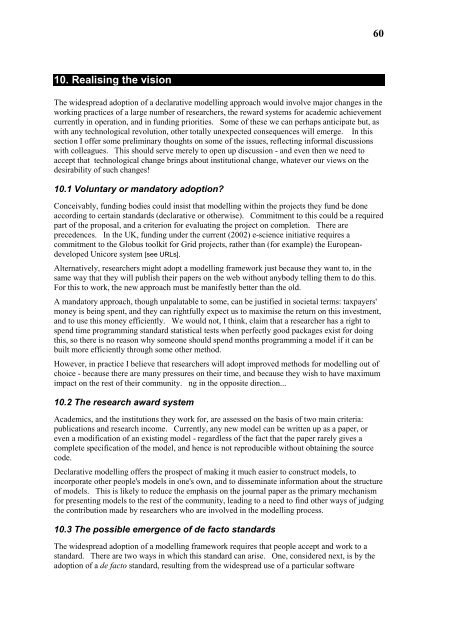pdf: 600KB - Potsdam Institute for Climate Impact Research
pdf: 600KB - Potsdam Institute for Climate Impact Research
pdf: 600KB - Potsdam Institute for Climate Impact Research
Create successful ePaper yourself
Turn your PDF publications into a flip-book with our unique Google optimized e-Paper software.
60<br />
10. Realising the vision<br />
The widespread adoption of a declarative modelling approach would involve major changes in the<br />
working practices of a large number of researchers, the reward systems <strong>for</strong> academic achievement<br />
currently in operation, and in funding priorities. Some of these we can perhaps anticipate but, as<br />
with any technological revolution, other totally unexpected consequences will emerge. In this<br />
section I offer some preliminary thoughts on some of the issues, reflecting in<strong>for</strong>mal discussions<br />
with colleagues. This should serve merely to open up discussion - and even then we need to<br />
accept that technological change brings about institutional change, whatever our views on the<br />
desirability of such changes!<br />
10.1 Voluntary or mandatory adoption?<br />
Conceivably, funding bodies could insist that modelling within the projects they fund be done<br />
according to certain standards (declarative or otherwise). Commitment to this could be a required<br />
part of the proposal, and a criterion <strong>for</strong> evaluating the project on completion. There are<br />
precedences. In the UK, funding under the current (2002) e-science initiative requires a<br />
commitment to the Globus toolkit <strong>for</strong> Grid projects, rather than (<strong>for</strong> example) the Europeandeveloped<br />
Unicore system [see URLs].<br />
Alternatively, researchers might adopt a modelling framework just because they want to, in the<br />
same way that they will publish their papers on the web without anybody telling them to do this.<br />
For this to work, the new approach must be manifestly better than the old.<br />
A mandatory approach, though unpalatable to some, can be justified in societal terms: taxpayers'<br />
money is being spent, and they can rightfully expect us to maximise the return on this investment,<br />
and to use this money efficiently. We would not, I think, claim that a researcher has a right to<br />
spend time programming standard statistical tests when perfectly good packages exist <strong>for</strong> doing<br />
this, so there is no reason why someone should spend months programming a model if it can be<br />
built more efficiently through some other method.<br />
However, in practice I believe that researchers will adopt improved methods <strong>for</strong> modelling out of<br />
choice - because there are many pressures on their time, and because they wish to have maximum<br />
impact on the rest of their community. ng in the opposite direction...<br />
10.2 The research award system<br />
Academics, and the institutions they work <strong>for</strong>, are assessed on the basis of two main criteria:<br />
publications and research income. Currently, any new model can be written up as a paper, or<br />
even a modification of an existing model - regardless of the fact that the paper rarely gives a<br />
complete specification of the model, and hence is not reproducible without obtaining the source<br />
code.<br />
Declarative modelling offers the prospect of making it much easier to construct models, to<br />
incorporate other people's models in one's own, and to disseminate in<strong>for</strong>mation about the structure<br />
of models. This is likely to reduce the emphasis on the journal paper as the primary mechanism<br />
<strong>for</strong> presenting models to the rest of the community, leading to a need to find other ways of judging<br />
the contribution made by researchers who are involved in the modelling process.<br />
10.3 The possible emergence of de facto standards<br />
The widespread adoption of a modelling framework requires that people accept and work to a<br />
standard. There are two ways in which this standard can arise. One, considered next, is by the<br />
adoption of a de facto standard, resulting from the widespread use of a particular software
















